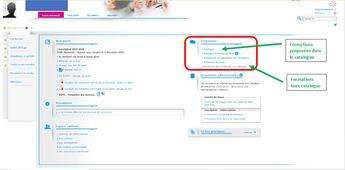
Doctoral courses
The objectives of doctoral training are to broaden the disciplinary horizon of the doctoral student and to facilitate his or her future professional insertion.
Complete your skills by taking doctoral courses
Doctoral training courses make it possible to offer young researcher-doctoral students, through a diversified offer, a multidisciplinary culture within the framework of a coherent professional project (cf. articles 3 and 15 of the order of May 25, 2016). These training courses, which are therefore useful for the conduct of the research project of the doctoral researchers but also for the development of their professional project, are provided through a set of modules and a shared regional scheme.
.The training courses complementary to the research work are modular and divided into three types:
- Training Domain 1 (DF1): Disciplinary modules (1)
- Training Domain 2 (DF2): Cross-curricular modules (2)
- Training Domain 3 (DF3): Professionalization or professional insertion modules (3)
Each doctoral student must accumulate a number of Doctoral Training Credits (DTC) issued by the ED, following his/her participation in doctoral training courses taken in the three areas indicated:
- 60 CFDs including at least 20 in professionalization for a classic thesis
- 30 CFDs obtained in France for a cotutelle thesis (4)
- 40 CFDs distributed over training areas 1 and 2 for CIFRE theses or for salaried PhD students.
Each doctoral student must have completed an ethics training among the transversal modules.
Attention, all your trainings must be done in agreement with your thesis director.
(1) : The DF1 corresponds to training courses that are part of the courses given in the thematic schools of the disciplines (e.g. summer or spring schools), those of the Master's courses and the engineering courses or are modules specifically dedicated to doctoral students.
(2) : The DF2 corresponds to all the modules and training courses allowing the researcher-doctoral student to broaden his or her spectrum of skills in one or more areas not directly related to his or her field of research. It includes, for example, language courses (English, French, ...), training offered by the SCD, training in LaTeX, the "research methodology" course, the "scientific writing design" module, those aimed at linguistic improvement of writings, the creation of websites, etc. In this area at least one training course must be dedicated to ethics.
(3): DF3 corresponds to all the professionalization modules offered by the Doctoral College.
Procedure 2021-2022
During the 2021-2022 academic year, trainings will be progressively implemented and you will be informed via the ED website of this evolution (on this page).
To register for trainings offered by the doctoral college you must register for trainings via ADUM.
You will find the Catalog of trainings organized by the Doctoral College 2021-2022 here:

You may validate "non-catalog" trainings, taken at other institutions with the approval of your director. After the training is completed, you file a request for validation of non-catalog training on ADUM by completing the requested information and filing proof of your participation.
Please note, the certificate of participation and the program specifying, in particular, the title of the training and the number of hours attended are to be filed in pdf format in your ADUM account under the heading "Non-Catalog Training", then "Add a Non-Catalog Training".
Participation in Disciplinary Modules
You have the possibility to follow, in agreement with your Thesis Director, training courses that are part of courses given in Masters, engineers or modules specifically dedicated to doctoral students in your laboratories (1 CFD for 2h of course).
In this case you must fill out the form: "Disciplinary training: Certificate of attendance" and return it to the ED for validation.
Participation in Language Modules
Participation in online training, MOOC (Massive Open Online Courses)
For the year 2021-2022, the ED PHF authorizes doctoral students to be able to validate 20 CFDs (at most over the entire thesis) by participating in MOOCs (1 CFD for 2h of courses). These participations must be done in agreement with your thesis director. A certificate will be required to provide to the ED so that this training can be validated.
On this attestation it will be necessary:
- to specify whether the training attended falls under Training Area 1, 2 or 3.
- to put the name and surname of your Thesis Director and to have it signed.
Version of 20 01 2022
